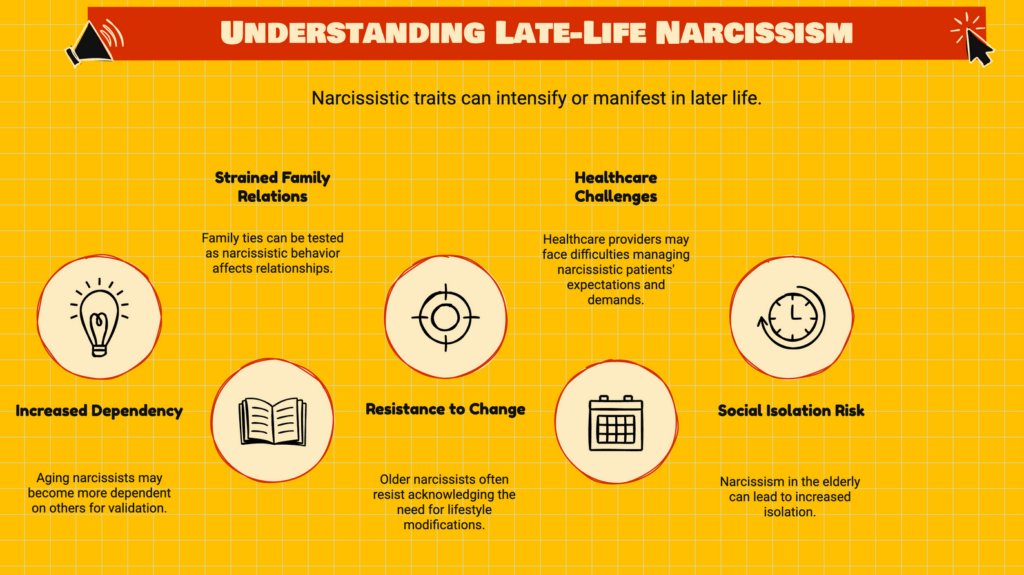When discussing narcissism, it is commonly believed to be a personality trait that emerges during adolescence or early adulthood. However, have you ever considered the possibility of developing narcissism later in life? Can life events and circumstances contribute to the onset of narcissism in later years? Join us as we delve into the captivating realm of late-life narcissism and unravel the mysteries surrounding this compelling topic.

Key Takeaways:
- While narcissistic personality disorder (NPD) typically develops in adolescence or early adulthood, there is a phenomenon called Acquired Situational Narcissism (ASN) that can manifest later in life.
- ASN occurs when individuals with preexisting high levels of narcissism achieve fame and power, leading to the development of full-blown NPD.
- Aging can be a time of existential crisis for narcissistic individuals, as they may struggle with the loss of societal-emphasized attributes like youth and beauty.
- Contrary to common belief, research suggests that narcissism shows a continuous decline with age, rather than increasing.
- Further research is needed to understand the complex relationship between age, gender, and narcissism.
What is Acquired Situational Narcissism?
Acquired Situational Narcissism (ASN) is a late-onset form of narcissism that can develop during late teens or adulthood. It is characterized by the acquisition of real and measurable power, rather than grandiose fantasies. Unlike Narcissistic Personality Disorder (NPD), which typically develops in adolescence or early adulthood, ASN is driven by the pursuit of wealth and status.
ASN develops, in part, as a response to the enabling behaviors of the individual’s support system and society. It is often observed in individuals, particularly celebrities, who already exhibit high levels of narcissism and actively seek fame and power. When they achieve these goals, full-blown NPD can manifest.
Distinguishing characteristics of ASN from NPD include the late onset in life, the acquisition of real power, and the response to environmental enabling rather than being rooted in grandiose fantasies. Unlike individuals with NPD who may have a distorted sense of self and exaggerated self-importance, those with ASN are driven primarily by the pursuit of wealth and status.
“Acquired Situational Narcissism is a unique phenomenon where individuals with preexisting high levels of narcissism develop full-blown NPD when they achieve fame and power.”
The Characteristics of ASN:
- Late-onset in life
- Driven by the pursuit of wealth and status
- Response to environmental enabling
Individuals with ASN are often celebrated and praised for their accomplishments, which further reinforces their narcissistic tendencies. This form of narcissism can be challenging to diagnose, as it is not included in the Diagnostic and Statistical Manual (DSM-V) but is recognized as a distinct form of narcissism.
With the increasing prevalence of fame and the pursuit of success in modern society, understanding the characteristics and development of Acquired Situational Narcissism becomes crucial in identifying and addressing the impact of late-onset narcissism on individuals and society as a whole.
A Case Study on ASN:
| Characteristics | ASN | NPD |
|---|---|---|
| Onset | Late teens or adulthood | Adolescence or early adulthood |
| Primary Motivation | Pursuit of wealth and status | Grandiose fantasies and self-importance |
| Development | Response to environmental enabling | Rooted in distorted self-perception |
Understanding Acquired Situational Narcissism can shed light on the complex interplay between social influence, personal characteristics, and the pursuit of success in late adulthood. By acknowledging and studying this phenomenon, we can gain insights into the dynamics of narcissism and its impact on individuals and society.
Risks of Acquired Situational Narcissism
Like individuals with Narcissistic Personality Disorder (NPD), those with Acquired Situational Narcissism (ASN) can exhibit maladaptive behaviors that have negative consequences in their lives.
One significant risk associated with ASN is poor decision making. As individuals with ASN strive for wealth and status, they may prioritize their own interests over others, leading to impulsive and reckless choices. This can have detrimental effects on their personal and professional lives.
Difficulty maintaining stable relationships is another consequence of ASN. The pursuit of fame and power often takes precedence over nurturing healthy connections, resulting in strained and dysfunctional relationships. ASN individuals may struggle to build and maintain lasting bonds with their partners, family members, and friends.
In addition, those with ASN may exhibit dysfunctional relationships with their children. Their self-centered focus may prevent them from providing the support, guidance, and nurturing environment necessary for a child’s healthy development. This can lead to long-term emotional and psychological impacts on the child.
Substance dependency is another potential risk for individuals with ASN. The allure of wealth and status can create a high-pressure environment, leading to stress and anxiety. Some may turn to substance abuse as a coping mechanism, further exacerbating their maladaptive behaviors and compounding the negative impacts on their overall well-being.
Moreover, individuals with ASN may abuse their power and authority. Their inflated sense of self-importance and entitlement can lead to disregard for the well-being and rights of others. This abuse of power can harm individuals and communities, perpetuating a cycle of dominance and exploitation.
Furthermore, individuals with ASN often experience high levels of anxiety and depression. The constant pursuit of validation and recognition can lead to a distorted relationship with reality, fueling feelings of insecurity and dissatisfaction. This emotional turmoil can have profound effects on their mental health and overall quality of life.
It’s essential to note that the risks associated with ASN are not exclusive to this particular form of narcissism. Many of these challenges and behaviors are common among individuals with narcissistic tendencies, regardless of the subtype they exhibit.

Overall, the risks of acquired situational narcissism highlight the detrimental effects that a pursuit of wealth and status without self-reflection and empathy can have on individuals and their relationships. By understanding these risks, individuals with ASN can seek support, therapy, and personal growth to mitigate the negative impacts and foster healthier and more fulfilling lives.
Prevention of Adult Situational Narcissism
While it may not be possible to completely prevent the development of Acquired Situational Narcissism (ASN), there are steps you can take to mitigate the risks. Focusing on personal growth and developing a healthy attitude towards power can reduce the likelihood of developing ASN.
Working on character development is an integral part of preventing ASN. By cultivating empathy, self-awareness, and humility, you can build a strong foundation that counters narcissistic tendencies.
Adopting a value system that aligns with your personal moral qualities can also serve as a defense against ASN. When you prioritize values such as integrity, respect, and kindness, you are less likely to be swayed by the allure of power and status.
Surrounding yourself with a support group that reflects those values is crucial in preventing ASN. A strong support network can keep you grounded, provide guidance, and hold you accountable, helping you maintain your healthy attitude towards power.
Avoid falling into the trap of seeking power for its own sake. Instead, focus on developing a healthy attitude towards power. Recognize that power should be used responsibly and consider how your actions impact others. Strive to use power as a tool for positive change and to uplift those around you.
Developing a healthy attitude towards power is not about avoiding power altogether, but rather about using it wisely and ethically.
While preventing ASN entirely may be challenging, you can take proactive steps to reduce the risks. By working on character development, adopting a value system that aligns with your moral qualities, surrounding yourself with a supportive network, and developing a healthy attitude towards power, you can navigate the path toward personal growth while minimizing the likelihood of developing ASN.

Can Narcissistic Personality Disorder Develop Later in Life?
While Narcissistic Personality Disorder (NPD) typically develops in adolescence or early adulthood, there is evidence to suggest that narcissistic traits can develop or worsen later in life. Various factors may contribute to the onset of NPD in later life, including childhood traumatic experiences, aging, and societal pressures.
Childhood neglect or abuse can have a significant impact on an individual’s psychological development, potentially leading to the manifestation of narcissistic traits in adulthood. The effects of these experiences can linger, contributing to the development of maladaptive coping mechanisms and a heightened need for validation and admiration.
Aging can also play a role in the development of NPD later in life. As individuals grow older, they may experience an existential crisis, grappling with the loss of societal attributes traditionally associated with youth and beauty. This loss can exacerbate feelings of insecurity and trigger a heightened desire for attention and admiration.
Moreover, societal expectations and cultural values can contribute to the development or exacerbation of narcissistic traits in later life. The emphasis on external validation, material success, and youthfulness in contemporary society can intensify an individual’s preoccupation with their self-image and fuel narcissistic tendencies.
“As individuals grow older, they may experience an existential crisis, grappling with the loss of societal attributes traditionally associated with youth and beauty.”
It is important to note that not all individuals with narcissistic traits will develop NPD later in life. Numerous factors, such as genetic predisposition, personal resilience, and supportive social relationships, can mitigate the development and progression of NPD.
| Factors Contributing to NPD Onset in Later Life | Description |
|---|---|
| Childhood Trauma | Individuals who have experienced neglect or abuse during childhood may be more susceptible to developing narcissistic traits later in life. |
| Aging and Existential Crisis | The process of aging and confronting mortality can trigger an existential crisis, leading to heightened narcissistic tendencies and a need for external validation. |
| Societal Pressures | Contemporary cultural values that emphasize material success, youthfulness, and external validation can contribute to the development or intensification of narcissistic traits in later life. |
| Genetic Predisposition | Personal resilience and genetic factors play a role in determining the susceptibility to narcissistic traits and the development of NPD. |
It is crucial to approach the topic of NPD delicately and with empathy. While recognizing the potential for NPD development in later life, it is important to remember that seeking professional help and therapy can facilitate personal growth and assist in managing narcissistic tendencies effectively.

The Theory of the Aging Narcissist
Research conducted by Michigan State University through a large-scale meta-analysis reveals an intriguing finding: narcissism actually declines with age, rather than increasing as commonly perceived. This contrasts the prevailing notion that younger individuals tend to exhibit higher levels of narcissism compared to older individuals. It is important to note, however, that there are variations in the definitions of narcissism, such as grandiose and vulnerable narcissism. Different components of narcissism may be affected in contrasting ways as individuals age, underscoring the need to distinguish between these components when studying the impact of aging on narcissistic individuals.

This study challenges the stereotype that aging narcissists become increasingly self-centered and obsessed with their own image. Instead, it suggests that aging may contribute to a natural decline in narcissistic tendencies. While the exact reasons for this decline are not fully understood, it may stem from a shift in priorities and a greater emphasis on interpersonal relationships and personal growth.
The Different Components of Narcissism
Narcissism is a complex personality trait that consists of various dimensions. One of these dimensions is grandiose narcissism, characterized by an inflated sense of self-importance, a need for admiration, and a lack of empathy for others. Another dimension is vulnerable narcissism, which encompasses feelings of insecurity, hypersensitivity to perceived criticism, and a constant need for reassurance and validation.
When considering the impact of aging on narcissists, it is important to analyze how these different components are influenced. It is conceivable that grandiose narcissism may decline due to a decreased focus on personal achievements and external validation as individuals age. On the other hand, vulnerable narcissism may persist or increase in older individuals who become more sensitive to threats to their self-esteem and anxieties related to aging.
The Importance of Further Research
While the Michigan State University study provides valuable insights into the relationship between aging and narcissism, there are limitations that should be acknowledged. The study’s cross-sectional design does not allow for tracking individuals over time, making it difficult to draw definitive conclusions about the impact of aging on narcissistic individuals. Additionally, variations in the measures used and the lack of longitudinal data pose challenges in accurately assessing the trajectory of individuals with clinically significant levels of narcissism.
Further research is necessary to gain a comprehensive understanding of the age-related changes in narcissism and their implications. Longitudinal studies that follow individuals over an extended period would provide valuable insights into the dynamics of narcissism as individuals age.
| Narcissism Component | Possible Impact of Aging |
|---|---|
| Grandiose Narcissism | Potential decline due to a shift in priorities and a decreased emphasis on personal achievements and external validation. |
| Vulnerable Narcissism | May persist or increase in older individuals who become more sensitive to threats to their self-esteem and anxieties related to aging. |
As research continues to unravel the complexities of narcissism and its relationship with aging, it is essential to consider the multifaceted nature of this personality trait. While aging may bring about a decline in certain aspects of narcissism, it is important to address the unique challenges and needs of individuals as they navigate the intricacies of their self-perceptions and interpersonal relationships.
Testing the Age-Gender-Narcissism Relationship
The Michigan State-led research team conducted a study to explore the relationship between age, gender, and narcissism scores. The findings provided intriguing insights into the age-gender-narcissism dynamic.
Surprisingly, the comparisons by gender revealed higher narcissism scores in men, contradicting societal expectations that women may struggle more with aging. This counterintuitive result challenges traditional assumptions and highlights the complexity of the age-gender-narcissism relationship.
However, isolating the effects of aging on different components of narcissism proved challenging due to variations in measurement tools and the absence of longitudinal data. The complexities of narcissistic traits and their manifestation over time require comprehensive and extensive research to draw definitive conclusions.
Although the overall effects of aging on narcissism were relatively small, it is important to delve deeper into the specific domains of narcissism to gain a more nuanced understanding. Further investigations are needed to identify the intricate interactions among age, gender, and different aspects of narcissism.
| Gender | Average Narcissism Score |
|---|---|
| Male | 6.8 |
| Female | 5.5 |
| Non-binary | 5.9 |
This table presents the average narcissism scores by gender, demonstrating the higher scores among men. It is important to note that these are average scores and individual variations exist within each gender category.
While this study provides valuable insights into the age-gender-narcissism relationship, its limitations must be acknowledged. The cross-sectional nature of the research design restricts the ability to track individuals over time, preventing a comprehensive analysis of age-related changes in narcissism. Additionally, generational differences make it challenging to distinguish between the effects of aging and broader cultural shifts.
The results of this study call for further research into the intricate interplay of age, gender, and narcissism to gain a comprehensive understanding. Longitudinal studies and refined measurement tools are essential for unraveling the complexities of the age-gender-narcissism relationship and its implications.
Learning to Adapt
The fate of aging narcissists may not be as terrible as anticipated. Life experiences can teach individuals, especially men, that they are not as important or great as they once believed. This newfound understanding can lead them to accept their vulnerabilities and stop competing with others.
Entering adulthood with confidence and high self-esteem can be particularly adaptive for navigating a competitive world. Aging narcissists can adapt by taking measures to preserve their appearance and abilities. Through their various roles, they may learn that they are not as great as they once thought.
Key Adaptation Strategies for Aging Narcissists:
- Maintaining self-care routines and appearance: Aging narcissists often focus on preserving their physical appearance to maintain their self-image and continue receiving external validation.
- Embracing vulnerable authenticity: Accepting vulnerability and acknowledging limitations can lead to more genuine and fulfilling relationships.
- Shifting focus from competition to collaboration: Aging narcissists can learn to appreciate the value of collaboration and cooperation, ultimately fostering more harmonious relationships.
- Finding fulfillment in non-narcissistic pursuits: Engaging in activities or hobbies that are not centered around validation or admiration can help foster personal growth and contentment.
“As you age, you have the opportunity to learn valuable lessons about humility and the importance of genuine connections with others. Embrace the journey of self-discovery and find fulfillment in authentic relationships.”
Learning to adapt to the challenges of aging requires a shift in mindset and a willingness to let go of the need for constant validation. By embracing vulnerability, collaborating with others, pursuing non-narcissistic interests, and prioritizing genuine connections, aging narcissists can find personal growth and fulfillment in their later years.

Limitations of the Research
The Michigan State study on late-life narcissism has provided valuable insights into the impact of aging on individuals with narcissistic traits. However, it is essential to acknowledge the limitations of the research, which primarily stem from the study’s cross-sectional design.
A cross-sectional design involves gathering data from a diverse set of participants at a specific point in time. While this design allows researchers to examine a large sample and draw preliminary conclusions, it does not track individuals over an extended period. As a result, it becomes challenging to distinguish between the effects of aging and generational differences.
Without longitudinal data, researchers cannot fully understand how narcissistic traits change or develop over time. Long-term studies are necessary to uncover the dynamic nature of narcissism and its relationship with advancing age.
Furthermore, the Michigan State study utilized a diverse set of measures and samples to capture different aspects of narcissism. While this approach provides a comprehensive understanding of the topic, it makes it difficult to pinpoint the trajectories of individuals with clinically significant levels of narcissism.
Generational Differences
“It is challenging to distinguish between the effects of aging and generational differences without longitudinal data.”
The study’s focus on generational differences also presents limitations. Generational differences can significantly influence attitudes, beliefs, and behaviors, including narcissism. However, without comprehensive longitudinal data tracking individuals over time, it is difficult to attribute changes solely to the aging process.
Despite these limitations, the Michigan State study provides valuable insights into the impact of aging on narcissistic individuals. It highlights the need for further research to overcome the challenges posed by the cross-sectional design and generational differences. Future studies incorporating longitudinal data and standardized measures can contribute to a more nuanced understanding of late-life narcissism.

Limitations of the Research
| Limitations | Description |
|---|---|
| Cross-sectional design | The study’s design, which gathered data at a specific point in time, hinders understanding of how narcissistic traits change over time. |
| Generational differences | Without longitudinal data, it is challenging to differentiate the effects of aging from the influence of generational factors. |
| Diverse measures and samples | The study’s use of various measures and samples makes it difficult to identify clear trajectories for individuals with clinically significant narcissism. |
Conclusion
In conclusion, late-life narcissism is a complex phenomenon that can develop or worsen in individuals who already exhibit narcissistic traits. While narcissistic personality disorder (NPD) typically emerges during adolescence or early adulthood, there is evidence to suggest that certain factors can contribute to its onset later in life. Acquired Situational Narcissism (ASN) is a notable example, where individuals with preexisting high levels of narcissism may develop full-blown NPD when they achieve fame and power.
Aging can pose unique challenges for narcissistic individuals as they confront the loss of attributes commonly emphasized in society. This period of existential crisis can trigger a range of emotions and behaviors. However, research indicates that aging tends to lead to a decline in narcissism overall, rather than an increase. Individuals may gain new perspectives and learn to adapt their attitudes and behaviors as they grow older.
While understanding the age-gender-narcissism relationship and the factors contributing to late-life NPD is crucial, there is still more to be uncovered. Further research is needed to gain a comprehensive understanding of late-life narcissism and its impact on individuals. By delving deeper into this topic, we can develop more effective strategies for prevention, intervention, and support for those grappling with late-life narcissism.











